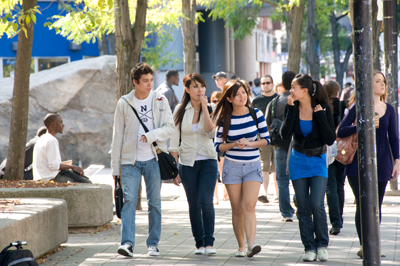Latest Soup & Substance Tackles Important Issue of Race and Racism
by Dr. Denise O'Neil Green | November 13, 2013 11:00 AM
By Antoinette Mercurio (Reposted with permission; some links added by the Institutional Diversity Blog)
 The monthly Soup & Substance series isn’t shying away from covering any topics in the equity, diversity and inclusion category including the latest session on race and racism.
The monthly Soup & Substance series isn’t shying away from covering any topics in the equity, diversity and inclusion category including the latest session on race and racism.
The conversation at the recent Soup & Substance has turned to Canadians and their overt politeness.
The monthly noon-hour series, moderated by Denise O’Neil Green, assistant vice-president/vice-provost equity, diversity and inclusion, has explored a range of diversity-related issues such as aboriginal identities, the LGBT community, and women and gender. The last one engaged in the topic of race and racism, asking the audience if Canadians are too polite. On the panel was Giselle Basanta, director of Ryerson’s Academy Integrity Office; Rodney Diverlus, senior theatre student; and Akua Benjamin, School of Social Work professor.
This topic was sparked by Green’s experiences as a newcomer to Toronto from the U.S. Professionals in equity, diversity and inclusion (EDI) roles expressed to her that “no one wants to talk about X, Y and Z because Canadians are just too polite”.
“Race matters matter and we have to learn how to speak about it”, Basanta said.
Diverlus supported Basanta’s point that language is an important aspect of talking about race and racism.
“People want to avoid an issue that they don’t want to tackle. Politeness comes from being uncomfortable”, Diverlus said. “Politeness leads us to be uncomfortable with key terms that are necessary to use in having these conversations”.
Green asked the panellists the ethical implications of making colourblindness the optimal goal in society. Benjamin doesn’t see how people can be colourblind.
“Race tends to raise these negative connotations but there’s also the resistance and resilience that comes out of it”, Benjamin said. “When we hear about race, it’s the sense it’s from the problem people”.
Basanta adds, “I don’t want to be colourblind, erased or irrelevant – I want to see colour. You raise people to be colourblind to what standard? White? Beige? I don’t want our ethnicity to be erased”.
The panel began a long discussion that culminated in some suggestions about the role post-secondary education plays in addressing racism. Diverlus implored attendees to take responsibility and raise these concerns in their own departments and sectors. “This is how conversations begin” he said.
Benjamin believes a combination of employers, teaching standards and curriculum can start the process of unlearning racism.
“Faculty representation has to do with hiring standards. Does the faculty reflect the diverse student population?” she said. “It’s not good enough to have representation of the diverse student body but also have content of the curriculum that speaks to race, racism and oppression – having research that explores those areas”.
Soup & Substance has become a positive forum for community members to express their experience and knowledge on EDI issues. Panellists are often a mix of students, faculty and staff who each bring a different perspective to the table. Sessions are held on the seventh floor of Heaslip House [297 Victoria Street] and the next one will be on November 27 – Being Aboriginal @ Ryerson, Part II.
Source URL: https://institutionaldiversityblog.com/latest-soup-substance-tackles-important-issue-of-race-and-racism/